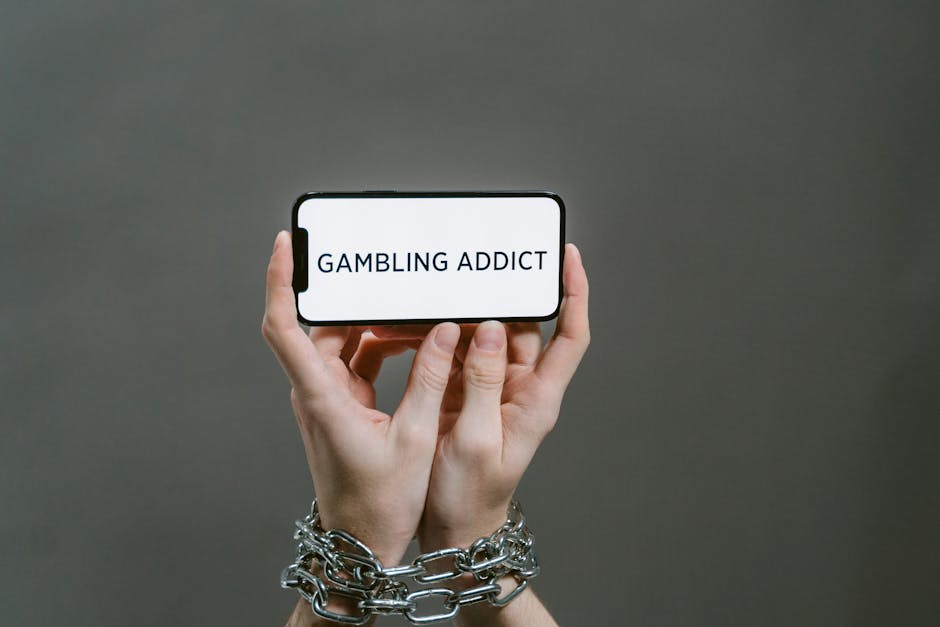Understanding Problem Gambling
Problem gambling isn’t just about losing money—it’s when betting starts interfering with daily life. It shows up in different ways, but at its core, it’s about loss of control. People keep gambling despite mounting losses, relationships breaking down, or bills stacking up. It becomes less about fun and more about chasing a feeling, or trying to fix past losses with bigger risks.
The red flags aren’t always obvious. Skipping work or lying about time spent online might seem harmless at first. Mood swings, secrecy about finances, frequent borrowing, or sudden unexplained debt—these are signs often overlooked. What may look like stress or distraction on the surface can be symptoms of something deeper.
Then there’s the damage under the surface. Emotionally, problem gambling isolates people, feeding shame, anxiety, and depression. Financially, it wrecks savings, ruins credit, and adds pressure to entire households. Families often feel helpless—stuck between wanting to offer support and fearing how far things might spiral. This is why spotting the signs early matters. It’s never just about the money. It’s about the people it affects and the silence that can grow around it.
First Steps Toward Help
Admitting there’s a gambling problem isn’t easy. For many, it takes brushing against rock bottom to even say the words out loud. Stigma and denial aren’t just buzzwords—they’re real barriers. Problem gambling often hides in plain sight because it doesn’t always look like what people expect. The consequences creep in slowly, until debt, distance, or distrust snap into view.
Starting the first honest conversation can be the hardest part—for everyone involved. Friends and family walk a line: support without pushing, listen without trying to fix. The best way to break silence is often by just showing up, being consistent, and offering space to talk without judgment. You can ask without accusing. You can care without controlling.
And yes, earlier is better. Problem gambling is like any addiction—the longer it breathes, the deeper it roots. Catching the warning signs and acting early can prevent a spiral into financial chaos or emotional fallout. People don’t need to fall apart before they’re worthy of help. Recognizing the issue early could be the difference between a stumble and a collapse.
Hotlines and Crisis Support
When you’re dealing with problem gambling—whether it’s you or someone close—getting help fast can make a huge difference. That’s where 24/7 helplines come in. National and local hotlines exist to be there at any hour, every day, without judgment. They’re confidential, often anonymous, and staffed by trained counselors who know what you’re going through.
Don’t expect a lecture. When you call or message, you’re met with calm clarity. They’ll ask a few basic questions to understand the situation and then guide you toward your next step. This could mean setting up a counseling appointment, connecting you to local resources, or just giving you space to talk it out.
Language barriers? Not a deal-breaker. Most national hotlines offer multilingual support or translation services. If you’re not ready to speak out loud, many also offer text or chat-based support—still private, still secure.
Bottom line: reaching out doesn’t mean you’re broken. It means you’re taking control. And that first call might be the turning point.
Counseling and Therapy Options
Getting professional support is a critical step toward recovery from problem gambling. The good news? There are several formats and access points, depending on personal needs, comfort level, and availability.
One-on-One vs. Group Therapy
Finding the right therapeutic setting can make a significant difference in a gambler’s recovery journey.
One-on-One Therapy:
- Offers personalized attention and privacy
- Tailored treatment plans focused on individual triggers and habits
- Ideal for those who may feel uncomfortable sharing in group settings
Group Therapy:
- Builds a sense of community and shared experience
- Encourages accountability and empathy
- Often more affordable and accessible
Each approach has unique benefits. Many individuals find success in combining both formats during different stages of their recovery.
Finding Certified Gambling Addiction Counselors
Professional guidance is most effective when provided by specialists with training in gambling disorders.
How to Locate Certified Help:
- Use directories from national mental health organizations or problem gambling associations
- Ask your primary care physician for referrals
- Contact local addiction centers—many have therapists who specialize in gambling
When searching, look for credentials such as:
- National Certified Gambling Counselor (NCGC)
- Licensed Clinical Social Worker (LCSW)
- Certified Addiction Professional (CAP)
Online Therapy for Greater Flexibility
In today’s digital world, therapy can happen wherever you are. Online treatment options are especially useful for those with limited local resources or busy schedules.
What Online Options Offer:
- Video sessions with licensed therapists specializing in gambling addiction
- Anonymous chat-based counseling for those preferring low-pressure engagement
- Flexible scheduling to accommodate varied lifestyles
Platforms such as BetterHelp, Talkspace, or dedicated programs offered by national gambling helplines often provide direct access to accredited professionals.
Whether in-person, group-based, or online, consistent and tailored therapy remains one of the most effective tools on the road to recovery.
Support for Families and Loved Ones
When a person struggles with problem gambling, their close relationships often face strain, confusion, and emotional distress. Families and loved ones may feel powerless, unsure of how to help without enabling harmful behavior. The good news: support resources aren’t just for the gambler—there’s help available for those around them too.
Tailored Resources for Families
Different family members experience the impact of gambling differently. What works for a partner may not match the needs of a parent or child. Fortunately, there are programs designed specifically for these roles:
- Partners and spouses: Support programs focused on building trust, communication, and joint planning.
- Parents: Counseling that includes education on addiction cycles and how to support without enabling.
- Children and teens: Age-appropriate support to help them process, understand, and feel safe amidst family challenges.
These resources help relatives protect their own mental health while remaining a source of healthy support.
Setting Boundaries Without Breaking Ties
Protecting your wellbeing doesn’t mean abandoning your loved one. Boundaries create space for healing—on both sides.
Tips for setting effective boundaries:
- Communicate clearly and calmly about what behaviors are unacceptable.
- Focus on actions you will take—not threats or ultimatums.
- Stick to boundaries consistently, without guilt.
- Prioritize safety and emotional health for everyone involved.
Setting boundaries allows families to stop cycles of blame and control, encouraging the problem gambler to take responsibility.
The Power of Peer-Led Support Groups
Sometimes, the most valuable support comes from others who’ve been in your shoes. Peer-led support groups offer a space to feel seen, heard, and validated.
Benefits of peer-led groups:
- Shared experiences reduce feelings of isolation and shame
- Practical advice from others who’ve navigated similar struggles
- A confidential, non-judgmental space for honest conversations
Groups like Gam-Anon, SMART Recovery for Families, and local support circles can be powerful tools in a family’s recovery journey.
Taking part in shared healing can also model positive coping strategies for the gambler, deepening mutual understanding over time.
Tools for Self-Management
When willpower alone isn’t cutting it, tools can help take over where motivation runs thin. Blocking software is first on the list. Apps like Gamban and BetBlocker let users restrict access to gambling sites and apps entirely—across devices. Many of these tools are free or low-cost, and setup takes minutes. If someone’s serious about change, this is a bare-minimum step.
Self-exclusion programs offer another layer. These aren’t apps—they’re commitment tools. You voluntarily ban yourself from online platforms or physical casinos, and in many cases, the systems actually work. It’s real accountability without the judgment.
For gamers especially, budgeting and time-tracking apps are crucial. Tools like Mint, YNAB, or Forest help users see exactly where their time and money are going. It’s easy to lose track in front of a screen for hours—these apps hold up a mirror.
Daily structure matters, too. Simple habit trackers—like Habitica or Streaks—make it easier to build routines and break cycles. Add in daily journaling or reflection prompts, and individuals can start connecting the dots between their behaviors and their mental state. Progress isn’t about perfection—it’s about seeing patterns and making small, deliberate shifts.
These tools won’t fix everything, but they give people a grip when things start to slide. And that grip matters.
Community and Peer Support
There’s something powerful about sitting across from someone who knows exactly what you’re going through. That’s the backbone of programs like Gamblers Anonymous. The format is simple: regular meetings, shared stories, and no judgment. It removes the isolation and gives members a space where honesty isn’t punished—it’s respected. The value isn’t just in the advice (though there’s plenty of that); it’s in the mutual understanding that builds over time.
For those who can’t attend in person, there are online forums and peer-led virtual groups. These range from structured chat rooms to anonymous message boards. They offer a quieter, more flexible way to connect—but still carry the same benefit: people who get it. When you no longer feel alone in your struggle, it gets easier to speak up, reflect, and begin doing the hard work.
Shared experience speeds up recovery. It shortens the path from shame to action. Because seeing someone a few steps ahead of you making progress—whether they’ve been clean six months or six years—makes that future feel possible.
Learning Safe Gaming Habits
The shift from high-risk gambling to healthy gaming starts with small, intentional changes. It’s less about quitting cold turkey and more about replacing destructive patterns with sustainable habits. That means setting time limits, defining spending boundaries before any session, and checking in with yourself before and after playing. It also means turning off auto-play, steering clear of high-frequency games, and choosing platforms that offer self-regulation tools.
Avoiding relapse isn’t about superhuman willpower. It’s about building guardrails: keeping cards off gaming accounts, scheduling play away from emotional triggers (like stress or boredom), and staying connected to a support network. The key is structure. A plan beats impulse every time.
Remember, healthy gaming doesn’t mean no gaming. It means playing with awareness, limits, and zero illusions about “winning big.” For more on setting practical boundaries, see How to Set Limits for Safe Jackpot Gaming.
Financial Recovery Resources
Facing financial hardship due to problem gambling can feel overwhelming, but it’s important to know that support is available—and recovery is possible.
Where to Get Help with Gambling-Related Debt
When debt becomes unmanageable, taking action early can prevent deeper financial trouble.
- Credit counseling services: Nonprofit organizations offer free or low-cost help in managing debt.
- Debt management plans (DMPs): These structured plans consolidate payments and may reduce interest rates.
- Consumer protection agencies: Can help address issues with lenders or clarify your rights.
Make sure any financial advice service is certified and reputable—avoid anyone promising “instant” solutions.
Talking to a Financial Advisor About Rebuilding Stability
Once immediate debt is stabilized, a licensed financial advisor can help you create a long-term recovery plan.
Key steps include:
- Reviewing your full financial picture, including income and spending habits
- Setting realistic budgeting goals tailored to your lifestyle
- Identifying ways to rebuild credit, savings, and long-term stability
Look for advisors experienced in working with clients recovering from addiction or impulsive financial behaviors.
Avoiding Predatory Loans and Quick Fixes
In moments of stress, it’s tempting to seek fast cash solutions—but these often do more harm than good.
What to watch out for:
- Payday loans: Extremely high interest and short repayment windows can worsen your situation
- Unsecured personal loans for “bad credit”: Often come with hidden fees or aggressive collection practices
- Promises of debt elimination: Many of these are scams with no legal backing
Instead, lean on credible nonprofits, financial coaches, or recovery circles that offer guidance without exploitation.
Reclaiming your financial well-being takes time—but with the right support, it’s absolutely within reach.
Moving Forward
Gambling recovery doesn’t stop at quitting. That’s just the first milestone. What matters long-term is structure—building a life that doesn’t default to old patterns. That starts with a plan. Not a grand, sweeping fix-all, but clear, manageable steps. Habit audits. Daily routines. Accountability check-ins. Recovery lives in boring consistency.
Rebuilding trust with loved ones takes even longer. No shortcuts here. Trust isn’t declared—it’s proven, in small, repeatable actions. Show up when you say you will. Tell the truth, even when it’s uncomfortable. Be patient when they don’t feel safe yet. You hurt them with behavior they couldn’t control; healing means allowing them time to see something’s changed.
And when setbacks happen—and they will—it’s not failure. Relapses aren’t the end of your story. They’re feedback. Recovery isn’t a straight line, but a jagged climb. What matters is not letting a stumble turn into surrender. Keep climbing. Ask for help again. Regroup, repair, and keep going. One honest day at a time.




